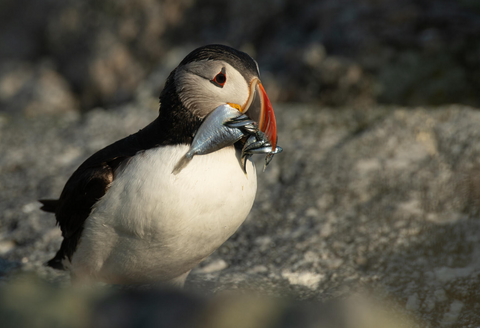A Puffin Problem
The Puffin Family Unit
Puffins are a migrating pelagic bird species that are born in nurseries on sub-arctic rocky coastlines. They travel north to arctic waters to forage for the duration of their time as juveniles and years later return to their birth places as adults to breed the next generation, then go back to the arctic for the winter.
Males will court a female partner, often the same partner over the years, to earn the chance to mate. The puffin pairs nest together to first protect their eggs, then the hatchlings throughout nesting season. The parents take turns to go out to sea and bring back mouthfuls of small fish for their chicks to eat and grow.
 Photo Credit: Walker Golder/Audubon
Photo Credit: Walker Golder/Audubon
Chick Food: the Atlantic herring
For centuries in the Gulf of Maine, the fish of choice to feed puffin chicks are small forage fish, especially Atlantic herring. Menhaden and Atlantic herring are schooling fish that form massive bait balls to defend themselves from predators, which range from sea birds to the endangered Right whale.
However, climate change and industrial fishing have severely damaged fish populations. Massive harvesting ships work in pairs to scoop up whole schools of fish in one big swoop. The fish are processed into products like Omega-3 supplements, dog food, and ground up in feed for farm animals, or packed into tins for grocery stores.
Recent successful legislation has taken small steps to reduce commercial fishing of forage fish, and bans near-shore purse seine fishing, but more need to be done (Audubon, 2021). Climate change has driven increasing water temperatures in the Gulf of Maine faster than any other part of the ocean and the cold-water Atlantic herring are staying farther away, so puffins, fishermen, and all the other dependent seabirds and predators are competing over fewer fish. (Jackson, 2022)
Puffins evolved to depend on the small fish and are left in the lurch looking for alternative food. In increasing observations, puffin caretakers have reported that the parent puffins have been coming back with a new type of small fish more commonly found in warm waters to the south, the butterfish(Audubon, 2019). But, butterfish are too wide and too big for the puffin chicks to swallow. (NPR, 2021)
What we can do.
In order to preserve the keystone menhaden stocks for puffins, whales, seabirds, seals, and other predators, here are some actions you can take to turn the tide:
- If you take Omega-3 supplements, check if your brand is made with fish. There are many algae-based Omega-3 alternatives that give you the same nutrients.
- Feed your pets food and treats without fish. Check the labels of your pet food and consult your veterinarian on the best option for your pet.
- Buy only vegetarian chicken and meat products at the grocery store.
With these few changes, we can help reduce the demand for Atlantic herring, menhaden, and other forage fish that are vital to their ecosystems.
An additional step for those who live in towns, cities, or states with forage fish industries: contact your local and state law officials to express your concerns about climate change and the ecological impact of monopolizing forage fish for human consumption and use. Change may not happen quickly, but it will only happen if we take the first step and make our voices heard.

